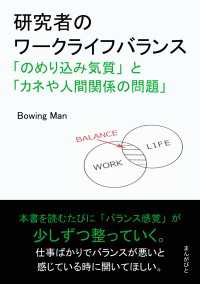- ホーム
- > 洋書
- > 英文書
- > History / World
Full Description
Water management, soil conservation, sustainable animal husbandry...because such socio-environmental challenges have been faced throughout history, lessons from the past can often inform modern policy. In this book, case studies from a wide range of times and places reveal how archaeology can contribute to a better understanding of humans' relation to the environment.
The Archaeology of Environmental Change shows that the challenges facing humanity today, in terms of causing and reacting to environmental change, can be better approached through an attempt to understand how societies in the past dealt with similar circumstances. The contributors draw on archaeological research in multiple regions—North America, Mesoamerica, Europe, the Near East, and Africa—from time periods spanning the Holocene, and from environments ranging from tropical forest to desert.
Through such examples as environmental degradation in Transjordan, wildlife management in East Africa, and soil conservation among the ancient Maya, they demonstrate the negative effects humans have had on their environments and how societies in the past dealt with these same problems. All call into question and ultimately refute popular notions of a simple cause-and-effect relationship between people and their environment, and reject the notion of people as either hapless victims of unstoppable forces or inevitable destroyers of natural harmony.
These contributions show that by examining long-term trajectories of socio-natural relationships we can better define concepts such as sustainability, land degradation, and conservation—and that gaining a more accurate and complete understanding of these connections is essential for evaluating current theories and models of environmental degradation and conservation. Their insights demonstrate that to understand the present environment and to manage landscapes for the future, we must consider the historical record of the total sweep of anthropogenic environmental change.







